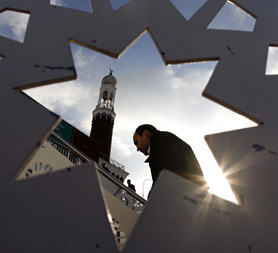Is Islamophobia becoming acceptable?
Baroness Warsi says that Islamophobia has ‘passed the dinner table test’ and is now acceptable in Britain. As Channel 4 News reports, journalists and commentators disagree over whether she is right.

In a speech for the University of Leicester, Baroness Warsi says that prejudice against Muslims has become widespread and socially acceptable in Britain.
Gaffar Hussein is a historian of Islam and a consultant at the anti-extremist Quilliam Foundation. He told Channel 4 News that Britain is on the whole a tolerant place for Muslims, saying: “It’s good she is raising the issue, but at the same time Britain is open and tolerant and we mustn’t blow this out of proportion.” He said that discussion on the issue should be nuanced: “There must be criticism of Islam as a faith or as a contemporary practise, not bigotry against people just because they are Muslims.”
One of the groups Baroness Warsi is targeting for criticism is the media, which she accuses of discussing faith in a ‘patronising and superficial way.’
But journalist Peter Hitchens disagrees, telling Channel 4 News that all religions should be open to criticism; “I am a Christian. If somebody doesn’t agree with my faith then they can disagree with it, because as a non-believer it’s a political ideology to them. There is a danger that legitimate criticism is passed off as Islamophobia.”
One of the claims Baroness Warsi makes is that the distinction drawn between “extreme” and “moderate” Muslims leads to intolerance. “It’s not a big leap of imagination to predict where the talk of ‘moderate’ Muslims leads,” she says. “In the factory, where they’ve just hired a Muslim worker, the boss says to his employees: ‘Not to worry, he’s only fairly Muslim’. In the school, the kids say: ‘The family next door are Muslim but they’re not too bad’.”
But Peter Hitchens argues that the division between different types of Muslim should be maintained: “To accept there are different kinds of Muslim is an important and rational distinction. I see Muslims as allies on moral issues but I disagree very strongly with Sharia law on women. I’m also not impressed with the way Islamic states treat people of my own faith, Christianity. This should be open to criticism by any civilised person.”
At the Quilliam Foundation, Mr Hussein also holds an opposing view to Baroness Warsi on the use of the terms. “I don’t agree with her on this. There is a spectrum of opinion with some people being orthodox, some liberal. But the distinctions must be nuanced.”
Evidence of hate crimes?
So what evidence is there to back up Baroness Warsi’s claims that hatred towards Muslims is increasing in Britain? A group of researchers at Exeter University have just completed a ten year study into anti-Muslim hate crimes.
Speaking to Channel 4 News Jonathan Githens-Mazer said that statistical evidence was difficult to obtain, because of the reluctance of Muslims to speak publicly about racially motivated attacks. But he said that his research led him to share Baroness Warsi’s views: ” Terms like extremist and radicalist are used with regard to Muslim communities by public thinkers in a way that wouldn’t be said about Buddhists or Jews. You would not hear someone described as a radical Buddhist.”
He also agreed with Baroness Warsi that Muslim discussion of all faiths lack depth:”It is part of a wider attack on faith and belief and of religiously-inspired political belief.”
Journalist Peter Oborne, has reported for Channel 4 on the issue of Islamophobia and also argues that the way people in the public eye speak about Muslims contributes to prejudice: “There are incredible remarks from some journalists, such as Polly Toynbee, who has been very critical of Islam. It’s clearly the case that people in priviliged positions feel able to make completely insulting remarks about Islam that are unthinkable about black people, Jews or homosexuals. It is the last barrier of bigotry.”
He believes this is feeding into everyday perceptions of Muslims in a dangerous way: “Ordinary people who read the press get a negative view and see Muslims as terrorists or as leading an international conspiracy to alter our way of life. There is no question that there is a direct link between mainstream writers and violence on the street against individual muslims.”
Many of the journalists who are critical of Islam say that accusations of prejudice stifle debate, but Mr Githens-Mazer disagrees: “Baroness Warsi’s comments open up a space to have discussion about Islam that moves away from always being about security, to a discussion that is more constructive, about the nature of being a Muslim in Britain.”
-
Latest news
-
‘We’re still a long way from justice’, says infected blood scandal victim5m

-
Infected blood scandal: Victims set to receive billions of government compensation7m

-
Iran’s president and foreign minister missing after helicopter crash3m

-
Yungblud launches his own affordable music festival5m

-
Why these Americans want to quit their state9m

-




